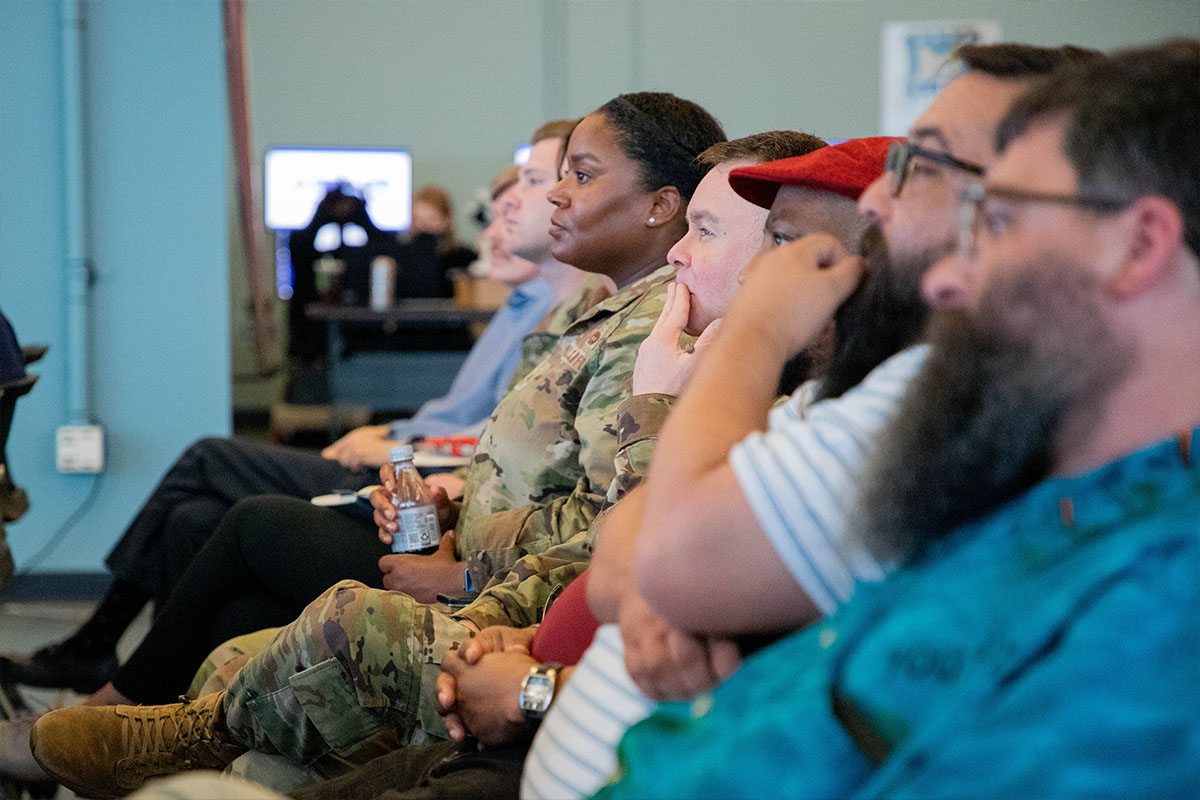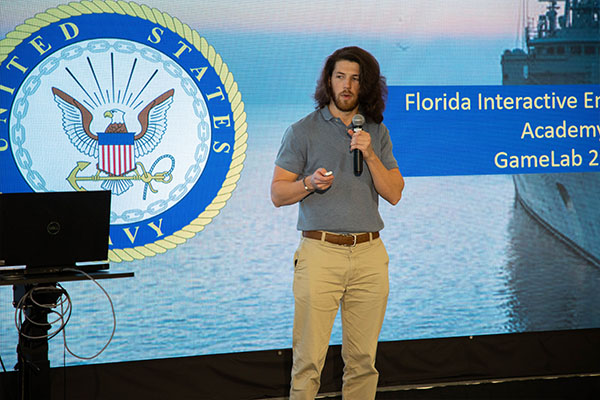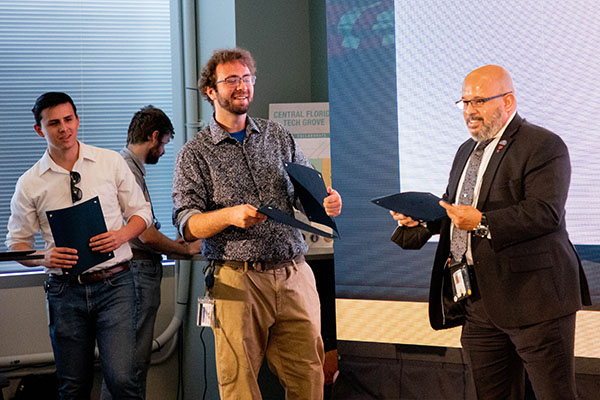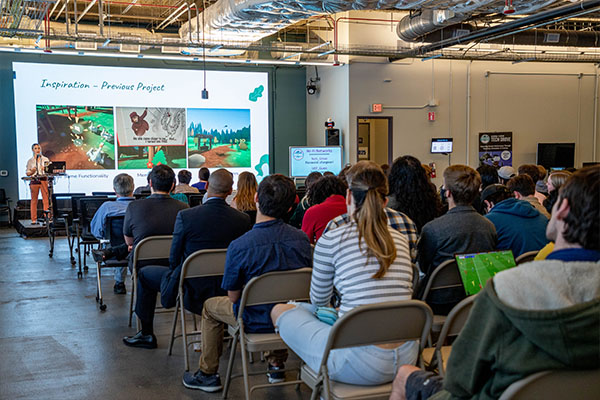Industry & Tech Students & Alumni
FIEA GameLab Makes a Difference
May 4, 2022

“It’s been a great experience all around,”
— Ethan Irwin, the project manager on Dark Castle
As he led a team building an Indiana Jones-style, narrative-driven, educational video game for UCF professor Dr. Ken Hanson as part of FIEA’s GameLab, Gabe Lopez faced some obstacles. Whether it was workload, disagreements over the project’s path or any number of conflicts during the three-month program, Lopez said he and his team pushed through. It was a direct connection with Hanson for feedback that helped Lopez keep his team on track, he said. “It had its ups and downs, but it kept us in line,” he said. “We had so many ideas that we could go overboard. So, the feedback was this anchor that kept us focused.”
The result was “The Dead Sea Scrolls Adventure,” a narrative-style game that takes players on a historic journey with the fictional character Jerusalem Jones as they learn about the historic Dead Sea Scrolls. It was one of seven projects produced by FIEA students for GameLab.

GameLab is a collaborative program that brings outside subject matter experts from several industries, including military, medical and others, together with students in FIEA’s advanced degree program.
Anthony Monteagudo, whose team built a virtual escape room with input from UCF’s Student Accessibility Services office, said it was “weird” but valuable to be put in charge of a team. “I would ask, ‘Is everybody OK with this?’” he said. “They’d respond, ‘Well, it’s your decision.’ The experience was valuable.” The game pulled elements from popular video games like “Portal” and “Witness” to create an escape room experience accessible to those with limitations.
SAS director Adam Meyer said he appreciated the passion that the team poured into the project from the start, echoing high praise that all teams earned from their subject matter experts. “You captured what we were looking for,” he told Monteagudo and his team during a presentation at Central Florida Tech Grove. “We wanted to work with a team that would take the time to learn about it.”
Officials from Veterans Health Administration, the U.S. Navy and the commercial company Brain R3 were among the experts helping the teams. In addition, students worked on projects for the University of Florida’s Human Centered Computing program and the U.S. Air Force. “It’s been a great experience all around,” said Ethan Irwin, the project manager on Dark Castle, which was built for the U.S.A.F. “In GameLab, you have a client and they tell you what they want. It’s a much different experience when you know what you are building and what you want vs. having to understand client expectations.”

In January, the students came together with subject matter experts to determine which projects they wanted to work on. Once the organizations pitched, teams of up to 14 came together around the projects and set off on the semester-long project. The back-and-forth with experts was valuable because it helped students see a bigger picture than usual, said Bre Seale, project leader for the Brain R3 entry, which aimed to provide relaxing experiences to Alzheimer’s patients.
“A lot of it is trying to make something that teachers will like, of course,” she said. “But it was also getting that wider lens of working with a third party.” Seale said the project taught her about Alzheimer’s disease, which also helped her get the team to work together. The game is a series of serene environments paired with audio and specific scripts to help alleviate any pressure on Alzheimer’s patients. But while that project relies on peace, quiet and serenity, Jerusalem Jones’ game certainly does not.
The multi-chapter adventure game brings players along for the ride as the titular character uncovers information and knowledge about the Dead Sea Scrolls. The goal was to create an experience that Hanson could embed into his students’ coursework that was a little less traditional. “I’m a teacher so my No. 1 responsibility is to create experiences that students will take with them,” Hanson said. “If a student listens to a lecture, how much will they actually learn? If I create experiences, they can be experiences that we all remember.”

As he helped introduce the team at the Tech Grove, Hanson said he was impressed by the work that was done on his behalf. He also said the constant check-ins and information sharing helped the team and him to ultimately get to their destination. “Without the instant communication, it would not have happened,” he said. The finished product “was a marvelous addition to the course and I will definitely make it a permanent insert into the course.”
As for the GameLab team that helped him create his vision, Hanson said the that it’s an option that has been a plus for him for multiple years. “It’s huge and there needs to be a lot more of this stuff integrated into our courses,” he said.
Here are more details on the projects that were built at GameLab and their clients.
- Dark Castle (USAF 338th Training Squadron, sponsor) (Ethan Irwin)
Dark Castle is a game made for the 338th Training Squadron of the United States Air Force to reinforce the fundamentals taught in class. The game allows students to practice the repetitive work they will need to know in the field as a supplement to hands-on practice In a lab. - Hypoglycemia (VHA, sponsor) (Chris Ressler)
This is a learning module for healthcare professionals in the VHA to train workers on how to recognize signs and symptoms of hypoglycemia and properly treat it. Utilizing both a classroom teaching scenario and a patient scenario our aim is to provide a robust and knowledgeable simulation to fully address common symptoms. - Virtual Escape Room (UCF Student Accessibility Services, sponsor) (Anthony Monteagudo)
A digital game inspired by UCF’s Barriers Be Gone Escape Room to teach about accessibility and increase awareness of environmental barriers. It is a 3D point-and-click puzzle game set in a space station which you are tasked with retrofitting to make more accessible for incoming guests. - Alzheimer’s Experimental Treatment Aid (Brain R3, Sponsor) (Bre Seale)
Alzheimer’s Experimental Treatment Aid is designed as a relaxing experience based on medical research provided by our subject matter expert. An interactive game that activates the brain’s gamma wave production, aiming to improve cognitive function and memory in patients with Alzheimer’s disease. - Project Vector (NAWC TSD, sponsor) (Grant Bentley)
Project Vector is a simulation game designed to help train the U.S. Navy’s E2 Air Intercept Controllers. It provides users realistic and gamified scenarios and quizzes them based on observations made during gameplay. - Flip the Board (UF Human Centered Computing, sponsor) (Dasha Kudryasheva)
Flip the Board is a VR game targeted for children ages 6+. It is based on a Russian folktale “The Fox and the Crane” and is designed to educate kids about empathy and conflict resolution. As players go through the game, they see both sides of a conflict between the main characters and learn how to navigate it and choose how they want to resolve it. - The Dead Sea Scrolls Adventure (UCF Judaic Studies, sponsor) (Gabe Lopez)
The Dead Sea Scrolls Adventure aims to greatly enhance the learning objectives of the course, JST 3144: Dead Sea Scrolls, in an enjoyable manner for the students playing it at UCF. Players play as Dr. Jerusalem Jones, an explorer set on finding out the history behind the 7 major Dead Sea Scrolls. Along the way, the player gets to meet a whole cast of characters and traverse across the deserts and caves near the Dead Sea as well as the streets of Bethlehem to learn about the history behind these relics.
Article written by Marco Santana